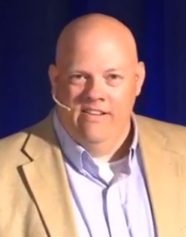A MESSAGE FROM THE REV. J.C. AUSTIN: OBSERVING THE TRIDUUM
As I mentioned last week, we are now in the midst of what the medieval church began calling the Triduum (“TRID-you-um”), which is simply Latin for “three days.” The Triduum begins on Thursday evening of Holy Week with the observance of Maundy Thursday, when Jesus had his Last Supper with his disciples, washing their feet, commanding them to love each other, and instituting the sacrament of Communion.
It continues with Good Friday, remembering the day that Jesus  was executed by crucifixion by the Roman Empire. Here at First Presbyterian, we observe Good Friday with a Tenebrae Service tonight at 8 p.m., a service that tells the full story of Jesus’ arrest, trial, crucifixion, and death, with candles extinguished after each lesson to create a service with increasing shadows and darkness.
was executed by crucifixion by the Roman Empire. Here at First Presbyterian, we observe Good Friday with a Tenebrae Service tonight at 8 p.m., a service that tells the full story of Jesus’ arrest, trial, crucifixion, and death, with candles extinguished after each lesson to create a service with increasing shadows and darkness.
Holy Saturday, then, is a time of contemplative waiting, between Jesus’ burial on Friday and the discovery of the empty tomb on Sunday. To mark that, we have a Compline Service of contemplative sung prayer on Saturday night at 8 p.m. And, of course, the Triduum concludes with the joyful celebration of Christ’s resurrection on Easter, which we will have at both 9 a.m. (contemporary) and 11 a.m. (traditional).
As I write this, we are about halfway through the “three days,” in the heart of Good Friday. The end of Good Friday and Holy Saturday are all about waiting, which is often hard for us in so many ways. So one of my personal Good Friday spiritual disciplines every year is to read a section of T.S. Eliot’s poem “East Coker” from his Four Quartets. I have shared this with you several times, and want to do so again this year because I personally find it so moving and helpful:
I said to my soul, be still, and let the dark come upon you
Which shall be the darkness of God. As, in a theatre,
The lights are extinguished, for the scene to be changed
With a hollow rumble of wings, with a movement of darkness on darkness,
And we know that the hills and the trees, the distant panorama
And the bold imposing facade are all being rolled away—
Or as, when an underground train, in the tube, stops too long between stations
And the conversation rises and slowly fades into silence
And you see behind every face the mental emptiness deepen
Leaving only the growing terror of nothing to think about;
Or when, under ether, the mind is conscious but conscious of nothing—
I said to my soul, be still, and wait without hope
For hope would be hope for the wrong thing; wait without love,
For love would be love of the wrong thing; there is yet faith
But the faith and the love and the hope are all in the waiting.
Wait without thought, for you are not ready for thought:
So the darkness shall be the light, and the stillness the dancing.
I hope this helps you center yourself in the Holy Week story, and especially in the hush at the end of Good Friday and on Holy Saturday. And I look forward to celebrating the good news of the empty tomb with you on Easter morning!
Grace and Peace,
J.C.
